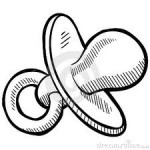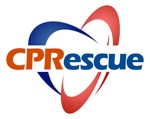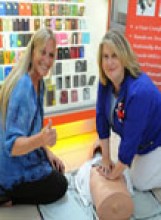Archive for January, 2013
Can You Influence Your Dreams?
Posted by: | Comments Can you effect the type of dreams you have at night? Many studies suggest you can and sleep is very important to your health. Poor sleep can have several health repercussions especially on your heart. So it’s important to try and get a restful night of sleep each day.
Can you effect the type of dreams you have at night? Many studies suggest you can and sleep is very important to your health. Poor sleep can have several health repercussions especially on your heart. So it’s important to try and get a restful night of sleep each day.
Each night you go through 4-cycles of sleep. These cycles repeat approximately every 90 minutes. Most adults have 4 to 5 of these sleep cycles every night.
1) The first cycle is the process when you are just beginning to fall asleep. You’re in a light sleeping state and can still respond to outside stimuli.
2) The second stage is where you go deeper into the sleeping state, you’re body temperature begins to decrease and your heart rate slows.
3) The third stage is where you are in a very deep sleep. You become less responsive to outside stimuli.
4) The final stage is called REM (rapid –eye – movement) sleep or the dream state.
The amount of time you spend in each of these cycles can vary during the evening. REM sleep can last for just a few minutes or up to an hour during an individual cycle. Having good or pleasant dreams can help how well you sleep and how rested you feel in the morning. Being able to influence on your dreams can have a positive impact on your health.
Researchers have found that smells can have an effect upon your dreams. The smell center of the brain is linked directly to the same part of the brain that controls dreams. Foul smells tend to produce more bad dreams or nightmares. The opposite seems to be true, where pleasant smells trigger more positive dreams.
Knowing that you can have an impact on how you dream, you may consider placing items in your bedroom that produce smells you find pleasant or engaging. It wouldn’t be pushing the envelope too far to see how you can manipulate your dreams to produce positive effects at night. Such as, perhaps inhaling a smell that reminds you of the good times you had with your Grandma who has past, you can possibly promote a positive dream about your Grandma during the that evening of sleep.
Most of us don’t remember all of the dreams you have each night, but that isn’t even the point. Even though you may not remember the positive dream of your Grandma, it will still be a pleasant experience you had during the night and will produce a more restful sleep.
You may want to try varying the smells in your bedroom to help improve your sleep, but if you’re having difficulty with your sleep each night, tell your doctor or seek the advice from a trained professional.
Sweet dreams.
How to Fight a Cooking Fire
Posted by: | CommentsFires when cooking are the number one reason for home fires. Quick attention could mean the difference between a small contained fire and one that consumes your entire home. Though we don’t anticipate a fire happening we should always be prepared in case one does arise.
When preparing meals at home, you should always keeping an oven mitt and a lid close-bye when cooking, especially when cooking with oils or grease. If a small grease fire occurs, with the oven mitt on, carefully sliding the lid over the pan to smother the flame. Depriving the fire of oxygen will extinguish the flame. Don’t blow on the fire, this could spread the grease or oils onto other surfaces and expand the fire. Immediately turn off the burner and don’t immediately move the pan. Wait until the pan completely cools before moving it. This will eliminate the potential of the fire re-igniting.
If you are not sure you can treat the fire safely, “when in doubt, just get out.” Leave and close the door behind you to help contain the fire. Call 9-1-1 or the local emergency number after you leave. If you DO TRY to fight the fire, be sure others are already getting out and you have a clear path to the exit.
Learn other first aid and safety skills from CPRescue.
Do Pacifiers Cause Sickness?
Posted by: | CommentsAs many parents can attest, the pacifier was one of the greatest inventions for childcare. It helps comfort your child and get can get a screaming infant to stop. Using them at bed or nap times helps sooth and aids in their rest. Another sometimes overlooked benefit is that, several studies have reported that pacifiers can greatly reduce the incidents of SIDS. These studies showed a 60% or better reduction of SIDS incidents with children who used Pacifiers during sleep time.
A downfall with pacifiers is that they can become unsanitary and contain high rates of bacteria, germs and fungi. In some studies the pacifiers tested included MRSA, the superbug that is resistant to many antibiotics. Infants that use pacifiers also had higher incidents of ear infections and dental problems when used incorrectly.
However since they do help significantly reduce the risk of SIDS, they are still recommended but you should do the following things:
- A pacifier should be cleaned anytime it comes out of an infant’s mouth, even if it doesn’t fall to the floor.
- Soap and water is all you need to clean your infant’s pacifiers. Then let air dry.
- Bring several pacifiers with you on outings. Carry in a clean baggie and replace with a spare when the pacifier is dropped.
- Don’t go for the cheap pacifier. Use ones that are sturdy and are age appropriate.
- Discard pacifiers if the child becomes ill. Replace to avoid reinfection.
- Stop usage of pacifiers on children over the age of 1.
For more information on how to treat an ill or injured infant or child, considering taking a Pediatric CPR and First Aid course.
Natural Way to Treat a Cold or Flu
Posted by: | Comments Unfortunately there isn’t a cure for the common cold or flu. The best we can do is treat to relief or help shorten the duration of the symptoms. If the symptoms are severe it is best to contact your physician. If medications are prescribed, make sure to complete the full regiment of medications, even if you begin to feel better. For those less severe symptoms you may want to take a more natural approach. Here are some suggestion:
Unfortunately there isn’t a cure for the common cold or flu. The best we can do is treat to relief or help shorten the duration of the symptoms. If the symptoms are severe it is best to contact your physician. If medications are prescribed, make sure to complete the full regiment of medications, even if you begin to feel better. For those less severe symptoms you may want to take a more natural approach. Here are some suggestion:
Blow Your Nose Often. It’s important to blow your nose regularly when you have a cold rather than sniffling mucus back into your head. But when you blow hard, pressure can cause an earache. The best way to blow your nose: Press a finger over one nostril while you blow gently to clear the other. Wash your hands after blowing your nose.
Get a Lot of Rest. Resting when you first come down with a cold or the flu helps your body direct its energy toward the immune battle. This battle taxes the body. So give it a little help by lying down under a blanket.
Gargle Several Times a Day. Gargling can moisten sore throats and bring temporary relief. Try a teaspoon of salt dissolved in warm water, four times daily. Or steep one tablespoon of lemon juice in two cups of hot water; mix with one teaspoon of honey. Let the mixture cool to room temperature before gargling. Honey should never be given to children less than 1 year old.
Drink Plenty of Liquids. Liquids helps prevent dehydration and helps the body flush out impurities. Hot liquids relieve nasal congestion and can soothe the uncomfortably inflamed membranes that line your nose and throat.
Take a Shower. Hot steamy showers moisturize your nasal passages, open up your pores and relax stiff and achy muscles. Refrain from taking a shower if you are dizzy.
Hot or Cold Packs for Congested Sinuses. Either temperature may help you feel more comfortable. A damp washcloth heated in a microwave for 55 seconds (test the temperature first before placing on your face). Or take a small bag of frozen peas to use as a cold pack.
Use an Extra Pillow. Elevating your head more will help with the drainage of nasal passages and help easy coughing.
Do Not Fly. Flying with cold or flu congestion can hurt your eardrums as a result of pressure changes during takeoff and landing. If you must fly, use a decongestant and carry a nasal spray with you to use just before takeoff and landing. Chewing gum and swallowing frequently can also help relieve pressure.
Remember, serious conditions can masquerade as the common cold and a mild infection can evolve into something more serious. If you have severe symptoms or are feeling sicker with each passing day, see a doctor.
Cervical Cancer Month
Posted by: | CommentsJanuary is the National Cervical Cancer Screening Month. Every year, almost 10,000 women in the United States get cervical cancer and about 3,500 women die from it. In developing countries, cervical cancer is a most important women’s health issue, killing some 200,000 women each year. Cervical cancer begins in the cervix, the part of the uterus or womb that opens to the vagina. Before doctors started using the Pap test in the 1950s, cervical cancer was the leading cause of death from cancer in women. In the United States, the Pap test saves the lives of 70% of the women who might have died from cervical cancer without the test. The single most important thing a women can do is participate in a regular screening program.
The new cervical cancer screening guidelines are as follows:
- Cervical cancer screening should begin approximately three years after a woman begins having sexual intercourse, but no later than at 21 years old.
- Experts recommend waiting approximately three years following the initiation of sexual activity because transient HPV infections and cervical cell changes that are not significant are common and it takes years for a significant abnormality or cancer to develop. Cervical cancer is extremely rare in women under the age of 25.
- Women should have a Pap test at least once every three years.
- Women 65 to 70 years of age who have had at least three normal Pap tests and no abnormal Pap tests in the last 10 years may decide, upon consultation with their healthcare provider, to stop cervical cancer screening.
- Women who have had a total hysterectomy (removal of the uterus and cervix) do not need to undergo cervical cancer screening, unless the surgery was done as a treatment for cervical precancer or cancer.
- Women should seek expert medical advice about when they should begin screening, how often they should be screened, and when they can discontinue cervical screenings, especially if they are at higher than average risk of cervical cancer due to factors such as HIV infection.
For more information about HPV, please go to http://newscenter.cancer.gov/BenchMarks/archives/2002_04/related_article.html.
For further information about cervical cancer and cervical cancer screening, please call the National Cancer Institute’s Cancer Information Service toll-free at 1-800-4 CANCER.
Need CPR Certification for your business in San Jose? Call us at 1-888-313-2444
Being Fat Helps You Live Longer
Posted by: | CommentsGained a few pounds over the holidays? Thinking about starting a diet? You may want to reconsider. A recent study did a systematic review of the findings from 97 previous studies concerning the Hazard Ratio (HR) for all causes of mortality (heart attack, cancer, disease, etc…) in overweight, obese and normal weight participants. These studies included 2.9 million people. Several adjustments were made to take into consideration, marital status, age, sex and smoking.
What they found was people that were considered overweight, with a Body Mass Index (BMI) between 25 – 30 had a significantly lower HR risk than those with what would be considered a normal BMI level of 18.5 – 25. Those with a BMI of 30 – 35 did not show any additional risk, but a BMI over 35 did show a greater HR.
Researchers caution that more studies and evaluations need to be done, that this information on BMI correlation is just an initial step in the process, but it does seem to indicate that having a few extra pounds on your body may not be such a bad thing. Remember exercise and eating well still play an important part in your overall health. Also consider taking a CPR and First Aid course to help you be better prepared to help out in an emergency situation.
Calculate Your BMI
Posted by: | CommentsTo give you a rough estimate, which is enough for this measurement, use the following calculation:
Take your height in inches and multiply it by the same number or squaring the number.
- Example: 6 feet tall = 72 inches Multiply 72 x 72 = 5,184
Now take you body weight and divide it by the calculation you come up with for the number above.
- Example: 190 lbs. 190 divided by 5,184 = .03665
Take the sum or this number (.03665) and multiply it by 703
- Example: .03665 x 703 = 25.7
This is the BMI number (25.7)







